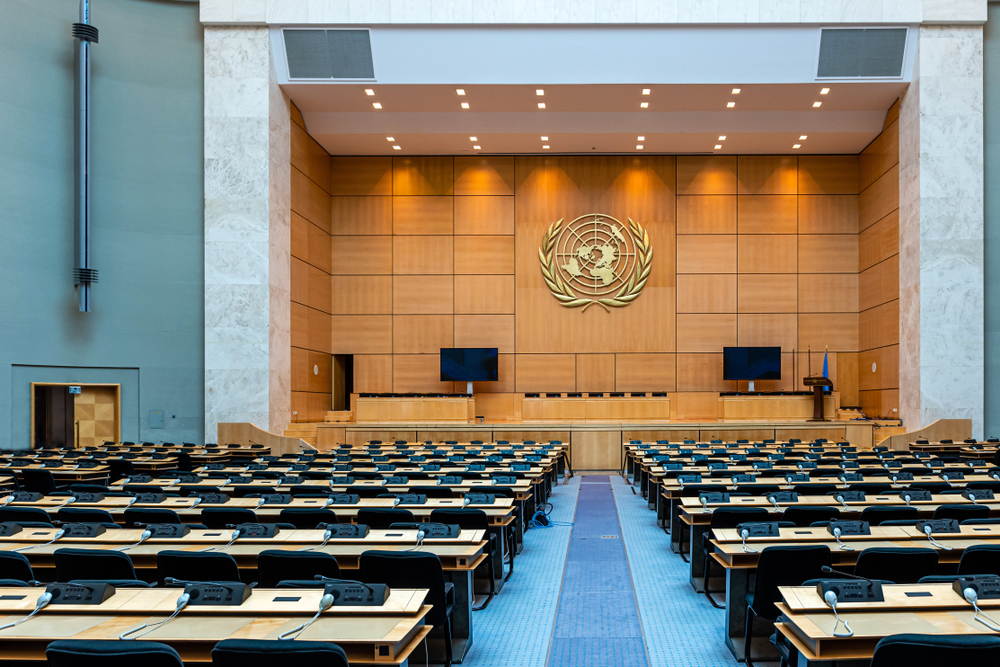Health is on the global agenda as delegates from all over the world gather for this year’s 75th World Health Assembly (WHA) in Geneva, Switzerland. The World Health Organization’s decision-making body is convening for the third year in a row against the backdrop of the COVID-19 pandemic, which has compounded historic inequities and given rise to growing demands to address them. This year’s theme, “health for peace, peace for health,” also recognizes the catastrophic impact of conflict and supply chain disruptions, which are complicating public-health efforts around the world.
Get Our Latest Public Health News
Join our email list and be the first to know about our public health news, publications and interviews with experts.
What accomplishments can we hope to see in Geneva that will pave the way toward global progress? One important marker of success will be the strength and scope of the coordinating mechanisms achieved for global action on noncommunicable diseases, such as cardiovascular and chronic respiratory diseases, cancers and diabetes.
In the meantime, here are three issues we hope will be addressed between May 22-28, 2022.
A Focus on Oral Health
One of the World Health Assembly’s overarching tenets is encouraging an “urgent paradigm shift towards preventing disease and promoting health.” As the WHA’s Executive Board noted in its detailed agenda, there are more than 3.5 billion cases worldwide of oral diseases and other oral conditions, most of which are preventable. The good news is, the World Health Organization has existing guidelines to intervene in and prevent the spread of common NCDs, which are intrinsically linked to negative oral health outcomes—particularly those associated with ineffective or lax policies regarding tobacco, alcohol, and ultra-processed foods. The WHA has pledged to define similarly clear and measurable goals for improving oral health by 2030 as part of the 75th Assembly. Swift and early action is needed, and the clock starts now.
Our take: An issue on the agenda this year, the global strategy on oral health, is at the intersection of several areas within Vital Strategies’ portfolio of key concerns, particularly tobacco control, food policy, and alcohol policy. Investing in oral health is a cross-cutting issue that could strengthen health systems, fill gaps, and improve equitable outcomes.
The Multi-Faceted Refugee Crisis
People make the difficult choice to leave their homeland for myriad reasons, whether to escape armed conflict and persecution, find better professional and educational opportunities or avoid the ravages of climate change. In the few short months since Russia invaded Ukraine in 2022, Poland has taken in more than three million of its displaced neighbors. And across the globe, the World Bank estimates that more than 140 million Sub-Saharan Africans, South Asians and Latin Americans could be forced to seek refuge elsewhere by 2050 without more urgent climate action.
The surge of migrants across borders on nearly every continent has put tremendous pressure on host countries’ health systems. Yet at the same time, it also presents an opportunity for nations to model fairer and more universal approaches to health care that will benefit its naturalized citizens in equal measure. One promising feature of WHA 75’s agenda is its pledge to “meaningfully involve people living with NCDs, affected communities and those in vulnerable situations, including forcibly displaced populations and refugees, in order to better understand their health needs.” The agenda likewise assures it will “focus on countries most vulnerable to the impact of climate change and extreme weather events.” Following through on those inclusive steps, granted a daunting task, could help mitigate the cost and stress of humanely accommodating the range of asylum seekers, which in turn might help make the issue less of a political cudgel.
Our take: Without stable homes, refugees often lack access to the medicines, preventative care and other treatments they rely on to live healthy lives. This connects to a wider issue of note: Global funding for NCD prevention and treatment overall. Our President and CEO, José Luis Castro, noted recently that although NCDs are responsible for the deaths of 44 million people annually, only 1%-2% of total health development assistance is allocated to the issue. Increasing the overall share of global financing dedicated to NCDs must be a core concept.
Healthier Food Policy
Few public health concerns are as widely prevalent and universally under-treated as the cause and effect between negligent food policy and preventable disease like obesity, Type 2 diabetes, heart disease, stroke and some cancers. Heading into WHA 75, the Executive Board has declared an intention to reinforce recommendations for “the prevention and management of obesity over the life course.” This view should properly consider the macro impacts of how countries procure, regulate and distribute food, to help minimize cascading, suboptimal health outcomes everywhere, from the Middle East to the West Indies.
Our take: Despite the robust evidence that links ultra-processed foods to serious health consequences, our research indicates that the public does not fully understand this group of products and the actions that can be taken to minimize their harmful impact. It’s high time that consumers had the opportunity to see ultra-processed foods for what they are: foods that are not real foods, containing nutrients but not real nutrition, pervasively marketed by supranational companies offering choices that are not real choices. And governments have a responsibility to make that happen. Read more.
Click here for a detailed list of side events taking place around the 75th World Health Assembly.
